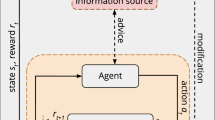Abstract
This paper presents an extension of the Motivated Learning model that includes environment masking, and opportunistic behavior of the motivated learning agent. Environment masking improves an agent’s ability to learn by helping to filter out distractions, and the addition of a more complex environment increases the simulation’s realism. If conditions call for it opportunistic behavior allows an agent to deviate from the dominant task to perform a less important but rewarding action. Numerical simulations were performed using Matlab and the implementation of a graphical simulation based on the OGRE engine is in progress. Simulation results show good performance and numerical stability of the attained solution.
Access this chapter
Tax calculation will be finalised at checkout
Purchases are for personal use only
Preview
Unable to display preview. Download preview PDF.
Similar content being viewed by others
References
Starzyk, J.A., Prasad, D.K.: A Computational Model of Machine Consciousness. International Journal of Machine Consciousness (2011) (to appear)
Starzyk, J.A., Graham, J.T., Raif, P., Tan, A.-H.: Motivated Learning for Autonomous Robots Development. Cognitive Science Research (2011) (to appear)
Rao, A.S., Georgeff, M.P.: BDI Agents: From Theory to Practice. In: Lesser, V. (ed.) Proceedings of the 1st International Conference on Multi-Agent Systems (ICMAS), pp. 312–319. MIT Press (1995)
Dastani, M., Dignum, F., Meyer, J.-J.: Autonomy, and Agent Deliberation. In: Proc. of the 1st International Workshop on Computational Autonomy (Autonomy 2003) (2003)
Wooldridge, M.: Reasoning about Rational Agents. In: Intelligent Robots and Autonomous Agents. The MIT Press, Cambridge (2000)
Sutton, R.S.: Temporal Credit Assignment in Reinforcement Learning. PhD thesis, University of Massachusetts, Amherst, MA (1984)
Fu, W.-T., Anderson, J.R.: Solving the Credit Assignment Problem: Explicit and Implicit Learning with Internal and External State Information. In: Proceedings of the 28th Annual Conference of the Cognitive Science Society. LEA, Hillsdale (2006)
iCub, RobotCub – An Open Framework for Research in Embodied Cognition (2004), http://www.robotcub.org/
Starzyk, J.A.: Motivation in Embodied Intelligence. In: Frontiers in Robotics, Automation and Control, pp. 83–110. I-Tech Education and Publishing (October 2008)
NeoAxis – all-purpose, modern 3D graphics engine for 3D simulations, visualizations and games, http://www.neoaxis.com/
OGRE – Open Source 3D Graphics Engine, http://www.ogre3d.org
Starzyk, J.A.: Mental Saccades in Control of Cognitive Process. In: Int. Joint Conf. on Neural Networks, San Jose, CA, July 31-August 5 (2011)
Author information
Authors and Affiliations
Editor information
Editors and Affiliations
Rights and permissions
Copyright information
© 2012 Springer-Verlag Berlin Heidelberg
About this paper
Cite this paper
Graham, J., Starzyk, J.A., Jachyra, D. (2012). Opportunistic Motivated Learning Agents. In: Rutkowski, L., Korytkowski, M., Scherer, R., Tadeusiewicz, R., Zadeh, L.A., Zurada, J.M. (eds) Artificial Intelligence and Soft Computing. ICAISC 2012. Lecture Notes in Computer Science(), vol 7268. Springer, Berlin, Heidelberg. https://doi.org/10.1007/978-3-642-29350-4_53
Download citation
DOI: https://doi.org/10.1007/978-3-642-29350-4_53
Publisher Name: Springer, Berlin, Heidelberg
Print ISBN: 978-3-642-29349-8
Online ISBN: 978-3-642-29350-4
eBook Packages: Computer ScienceComputer Science (R0)




